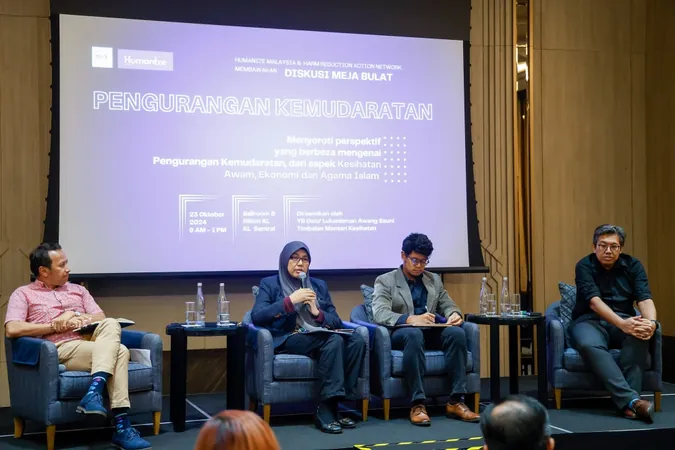
Transforming Malaysia's Healthcare: How Embracing Harm Reduction Policies Could Save RM900 Million by 2050
2024-10-31
Author: Daniel
Transforming Malaysia's Healthcare
KUALA LUMPUR, Oct 31 — Malaysia finds itself at a crossroads in healthcare spending, particularly regarding the management of drug-related offenses. Currently, the nation spends a staggering RM36,000 annually to imprison individuals for drug-related crimes. However, innovative harm reduction programs, such as needle exchange initiatives and methadone treatment, present a viable alternative. By shifting the focus from incarceration to rehabilitation, costs could plummet to an astonishing RM2,000 to RM3,000 per participant.
A recent study by the Galen Centre for Health and Social Policy, utilizing data from the University of Malaya’s Centre of Excellence for Research in AIDS (Ceria), suggests that Malaysia could save up to RM900 million in healthcare costs by 2050 by adopting harm reduction strategies.
The report emphasizes not only direct financial savings but also the broader implications of such policies. For example, investing just one ringgit in harm reduction programs could yield healthcare savings of up to RM4. This remarkable return on investment stems from a significant decline in HIV infections among individuals who inject drugs.
From 2013 to 2023, harm reduction initiatives have successfully reduced new HIV infections by an impressive 87%. Looking forward, projections indicate a potential decrease of up to 79% in infections by 2050, suggesting a future where healthcare costs associated with HIV/AIDS could be enormously minimized.
Azrul Mohd Khalid, CEO of Galen Centre for Health & Social Policy, highlighted these findings during a recent panel discussion organized by Humanize Malaysia and the Harm Reduction Action Network (HRAN). At this roundtable, several healthcare professionals called for enhanced education and awareness initiatives to combat the stigma faced by HIV patients in Malaysia. They underscored how discriminatory attitudes among healthcare providers can severely impact patient care and public health outcomes, especially in the context of harm reduction policies.
Moreover, the panel addressed the misconceptions surrounding HIV prevention treatments, with some doctors grappling with the fear of inadvertently condoning risky behaviors. It is crucial to acknowledge that while HIV can severely compromise the immune system if left untreated, it remains manageable with contemporary medical therapies.
HIV is primarily transmitted through unprotected sexual intercourse, blood contact, the sharing of contaminated needles, and, notably, from mother to child during childbirth or breastfeeding. These routes underscore the importance of effective prevention programs that not only protect individual health but also enhance communal well-being.
The shift towards harm reduction could signify a monumental change in Malaysia's approach to healthcare, highlighting a global trend that values public health over punitive measures. As Malaysia moves forward, it stands at the brink of a transformative healthcare paradigm—one that prioritizes compassion, understanding, and comprehensive treatment. The question remains: will Malaysia seize this opportunity for significant reform in the name of health and humanity?


 Brasil (PT)
Brasil (PT)
 Canada (EN)
Canada (EN)
 Chile (ES)
Chile (ES)
 España (ES)
España (ES)
 France (FR)
France (FR)
 Hong Kong (EN)
Hong Kong (EN)
 Italia (IT)
Italia (IT)
 日本 (JA)
日本 (JA)
 Magyarország (HU)
Magyarország (HU)
 Norge (NO)
Norge (NO)
 Polska (PL)
Polska (PL)
 Schweiz (DE)
Schweiz (DE)
 Singapore (EN)
Singapore (EN)
 Sverige (SV)
Sverige (SV)
 Suomi (FI)
Suomi (FI)
 Türkiye (TR)
Türkiye (TR)